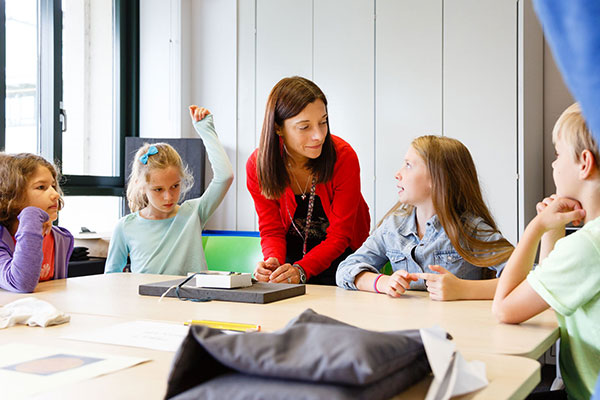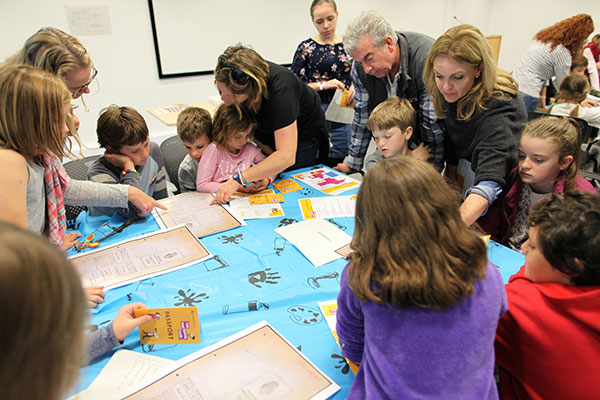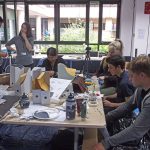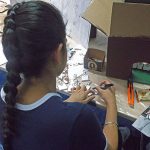We’re excited about the publication of our new book, ‘100 ideas for Primary Teachers: History’ (Bloomsbury 2019). This draws on our previous experience as history teachers in the state education system and our present practice at The National Archives in archival education.
Each ‘idea’ in the book is based on an original historical source from The National Archives, taking a skills-based approach to help students understand the methods of historical enquiry, and make history real, captivating and exciting. The sources used include photographs, government reports, cartoons, royal seals, manuscripts, and private and official letters: these allow students to build a picture of the past. The historical sources can be previewed in the book and downloaded from Bloomsbury’s companion website.

A session of the Time Travel Club
Working with original sources is central to all of our work in the Education and Outreach department at The National Archives. It is so important, because to engage with ‘the real stuff’ of history is the most effective way of bringing history alive for both students and their teachers. Seeing original documents at close quarters is rewarding in itself; but this immediacy also teaches a fundamental lesson – that the study of history involves an enquiry-based approach. Sharing the original records – as we do during our on site educational workshops or through our online resources – allows students to formulate their own interpretations and questions, often outside the usual narratives provided by school textbooks. It also means that students work with fascinating sources which they are unlikely to have encountered before.
For example, our on site schools workshops offer both A level and GCSE history students the opportunity to immerse themselves in the world of Elizabethan politics. They can scrutinise a selection of the queen’s original speeches and letters, and familiarise themselves with the personality of this formidable monarch and the challenges she faced. At the other end of the scale, primary school children can experience a workshop session called ‘What is history?’ They study a range of original artworks, maps and documents to discover how these sources can be used to learn about the past.
Our SEND programme – specifically designed for pupils with severe learning difficulties and profound and multiple learning disabilities – employs multi-sensory and interactive activities based on original records to engage students. For example, students can find out about life in Victorian England, exploring ‘hook’ documents in a sensory way through the sights, sounds, smells and textures of a Victorian street.
For those students and teachers who cannot visit The National Archives, we offer an interactive virtual environment that enables students to participate in a live session led by an actor or an education officer. Students interact on computers or tablets to examine and annotate high-quality digital images of original documents; they can also ask questions through a chat-box or microphone. Examples include a session based on the sinking of RMS Titanic, exploring information and testimony submitted to the British government inquiry, and a session based on Colonial records called ‘Resistance and Rebellion in the Caribbean: How did enslaved people resist?’
Videoconferencing with documents is another option on offer. Young pupils can experience (for example) a lesson on Henry VIII based on his use of imagery to display royal power. Document images are projected into the classroom for students to analyse and interpret. Original documents can also be viewed using a bird’s-eye camera. Students ask questions and share ideas with the education officer, and have the opportunity for paired or group discussion.
Our series of education study days have offered a different experience for students. From Magna Carta to the Suffragettes, these days offer an exciting way to engage with large numbers of students at the same time, and support learning with original sources. With a keynote lecture from an eminent historian, and a series of on site interactive teaching workshops, these study days have had great support from staff across the organisation.
The National Archives produces a range of stand-alone online resources for use in the classroom. These include over 60 online lessons based on documents ranging from Edgar the Peaceful to the World Cup 1966. We have more than 15 themed document collections based on different time periods.These now include a collection on the 1960s and our most recent two-part collection on medicine, injuries and treatments during the First World War. Each collection is introduced by a historian of the period and contains teachers’ notes with suggestions on how to use them in the classroom. You can download all the original documents, which are copyright-free for use in the classroom. Finally, we have produced a host of in-depth topic websites featuring source-based case studies ranging from Domesday Book to the Cold War.
But our work in the Education department isn’t just about supporting formal education and exams. Informal education continues through our growing young peoples’ programme. For instance, we have now completed our third summer film project called ‘Holding History’: 14 young people (aged 16 to 19) worked with professional filmmaker, Nigel Kellaway, exploring documents from our collection spanning key events from the past 1,000 years of history. They posed questions through film about the challenges faced and importance of archives today.
- Some of our film-makers at work
- Creating stop-frame animation
Young people from Anstee Bridge, a Kingston-based project that helps young people aged 15 to 16 build confidence and resilience through creativity, spent a week working with the Education team to explore documents about the creation of the NHS. This research and their creative response to this – a collection of beautiful zines – will be showcased at The National Archives in a performance and art exhibition during July 2019.
This summer another young people’s project, ‘Armistice and Legacy’, involved examining the events of the First World War and the impact it had on soldiers and civilians. The participants created a graphic novel, working with with artist Carol Adlam: our second such project.
Our Time Travel Club family programme – in which the Education team develops and delivers a wide range of sessions – has many highlights. Recent workshops have included a sensory story-telling experience for four to six year-olds, ‘Arctic Adventure’: visiting families took an imaginary journey across the Arctic inspired by one of the beautiful maps in our collection. During October half term, older children aged seven to 11 worked with original documents to learn about the discovery of Tutankhamun’s Tomb. Then they took part in a creative activity, making their own pencil cases in the shape of a sarcophagus and decorating them with Egyptian hieroglyphics.

A family session of the Time Travel Club
Arguably, all this work with schools, young people and families – involving both formal and informal learning – shows the importance of archives opening up their collections and running activities based on original records. This concept was recently epitomised by the recent Kids in Museums day. Sixty-six children from the Blue School in Isleworth took over The National Archives for an ‘in your shoes’ experience. It was the first time we had taken part; although the day was initiated and planned by the Education department, it was truly a whole-team effort, with ten National Archives departments participating. The last word definitely goes to ten-year-old Ellen, who commented:
One of the first ‘historic’ things we saw was an old fashioned letter to the queen, Queen Victoria! I never knew I would see this, I’ve learnt loads about her in school and other places but I never thought I’d see something sooo fascinating!


very informative post. thanks for sharing such a truthful article. keep posting the best posts like this article